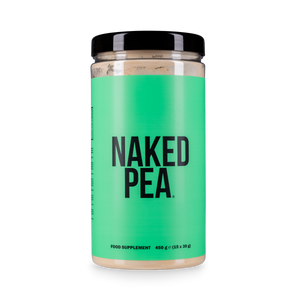If you take BCAA supplements during a fasting window, technically you might be breaking your fast. But it won't disrupt your fast in the same way as eating a meal.
In some cases, the benefits of BCAAs may outweigh the negatives of breaking a fast.
Read on to learn more.
BCAAs and Intermittent Fasting
Intermittent fasting and taking a branched-chain amino acids (BCAAs) supplement offer promising benefits for improving body composition.
BCAAs are 3 of the 9 essential amino acids, namely leucine, valine, and isoleucine. People primarily take BCAA supplements for muscle building, and reducing muscle soreness after a workout.
However, it's confusing to know if doing both at once is helpful or counterproductive.
Finding time to squeeze in all of your meals and supplements during the shortened intermittent fasting eating window can be challenging.
If you're used to taking BCAAs before or during a workout, you might wonder if you can still take them during a fast.
Here's our take on BCAAs while intermittent fasting.
Taking BCAAs During Intermittent Fasting
The benefits of taking branch chain amino acids during a fast can outweigh the downside of technically breaking a fast for most people.
BCAAs are unique compared to other amino acids because they are metabolized directly in the muscle, instead of in the liver.
Since taking BCAAs doesn't give you a ton of amino acids at once, it won't add up to a large number of calories breaking your fast.
Furthermore, BCAAs alone won't cause a large insulin response.
Also, check out our strawberry lemonade BCAAs.
Benefits of BCAAs for Muscle Mass

BCAAs help with muscle fatigue, so you can workout harder and longer to build more muscle.
They also help with muscle recovery so your muscle fibers repair themselves more quickly and you don't have as much downtime between lifting sessions.
BCAAs While Intermittent Fasting
The most appealing benefit of BCAAs during intermittent fasting is it's potential to help preserve muscle during a fast.
Someone who doesn't workout in a fasted state likely eats a meal before or after to replenish the body with energy to repair muscle breakdown.
However, working out in a fasted state means a person is not eating anything before or after a workout.
Therefore, some worry that they may not build as much muscle during a fasted workout.
Taking branched chain amino acids before, during, and/or after a workout boosts the muscles with energy during a fasted workout, and helps the muscles recover and rebuild more mass.
Should I Take BCAAs During Intermittent Fasting?

So while technically BCAAs break a fast, if your main goal is to increase muscle mass, then you might still benefit from taking bcaa supplements to prioritize muscle growth.
And as we mentioned before, BCAA supplements won't cause an insulin response as heavily as a snack or a meal, so even though you're technically not fasting anymore you won't be ruining your fast per se. It's just some amino acids.
You could also go a bit broader and take an essential amino acids supplement like Naked EAAS to cover all nine essential aminos for optimal muscle protein synthesis (instead of only the branched-chain amino acids).
More on Intermittent Fasting
Intermittent fasting is a unique eating style because it's dictated by when you eat, rather than what you eat.
In other words, it's not a diet.
Here are some of the several different methods for fasting.
Popular Intermittent Fasting Protocols

The 16:8 Method
The 16/8 method involves fasting for 16 hours and restricting your eating window to 8 hours.
Typically, this involves skipping breakfast and eating your meals within an 8-hour timeframe, such as from 12 pm to 8 pm.
The 5:2 Diet
With the 5:2 diet, you eat normally for five days of the week and reduce your calorie intake to around 500-600 calories on the remaining two non-consecutive days.
These fasting days should not be consecutive but rather spread out throughout the week.
Eat-Stop-Eat
This method involves fasting for 24 hours once or twice a week.
For example, you might finish dinner on Monday and not eat until dinner on Tuesday.
Alternate Day Fasting

Alternate day fasting is a more rigorous approach where you alternate between days of fasting and days of normal eating.
On fasting days, you may consume very few calories or completely abstain from food.
What are the Benefits of Intermittent Fasting?
Before we get into the benefits of fasting, its crucial to note that a lot of these benefits have not been confirmed by research when it comes to humans.
There's evidence of fasting benefits on animals but that doesn't necessarily mean those benefits translate to humans as well.
Before starting on an intermittent fasting protocol, you should speak to a licensed nutritionist or your doctor to make sure fasting is beneficial and safe for you.
Also, listen to your body. If you start feeling dizzy or lightheaded or have any other side effects, then maybe best to scale back a bit and slowly build up your fasting tolerance.
That being said, here are the perceived benefits of fasting.
Body Composition

Intermittent fasting can be an effective tool for weight management and fat loss.
By restricting the eating window or reducing overall calorie intake, it can create a calorie deficit, leading to weight loss.
Additionally, fasting can enhance fat burning by tapping into stored body fat as an energy source.Improved Insulin Sensitivity
Improved Insulin Response
Intermittent fasting has shown promising effects on insulin sensitivity.
It can help regulate blood sugar levels and improve insulin sensitivity, which is particularly beneficial for individuals with type 2 diabetes or those at risk of developing it.
Enhanced Autophagy
Fasting triggers a cellular process called autophagy, which is the body's way of recycling and removing damaged cells and cellular components.
Autophagy has been linked to various health benefits, including improved cellular function, reduced inflammation, and potentially even a decreased risk of age-related diseases.
Increased Human Growth Hormone (HGH)
During fasting, the body can experience an increase in human growth hormone (HGH) levels.
HGH plays a crucial role in muscle growth, fat metabolism, and overall body composition. Higher levels of HGH may promote muscle preservation and fat burning.

Cognitive Benefits
Some studies suggest that intermittent fasting could have cognitive benefits, including improved brain function and neuroprotective effects.
Fasting may stimulate the production of certain molecules that support brain health, potentially enhancing focus, memory, and overall cognitive performance.
What Can You Eat and Drink During a Fast?
Basically, nothing that has caloric value, or triggers an insulin response. That means no food and only water, plain coffee, and tea to drink.
Beyond that, some people drink artificially sweetened beverages, but others avoid them because some sweeteners trigger the release of insulin.
The benefits of intermittent fasting are based on the idea that fasting causes insulin levels to drop and fat cells can be used for energy.
Breaking a fast means insulin levels rise and the body stops using fat for energy.
Technically, consuming amino acids does break your fast. Amino acids combine to become protein, which contains calories that your body has to metabolize.
However, taking BCAAs prior to a fasted workout may be an acceptable exception.

What You Eat After A Fast Matters Too
Just because intermittent fasting isn't a diet doesn't mean you should lose focus on the foods you do eat.
You can really maximize the results from this eating style combined with your workouts and BCAA supplement if you eat a diet to support your goals.
Be sure to take some time to plan the best way to meet your macronutrient goals during a shortened eating period.
If your goal is to put on muscle, your needs may be high and some strategy may be required to get everything your body needs.
Although protein is the most important for building muscle, eating enough carbohydrates and healthy fats will also impact your results.
Not only will this support the leanest tissue growth, but it will also help give you sustained energy for the duration of your fast.
It's likely you will even notice more energy during your workouts. Staying hydrated during a workout is also key to feeling great during a fasted workout.

Do BCAAs Break Intermittent Fasting: Bottom Line
If you're looking for a way to improve your endurance and recovery, as well as help preserve muscle mass during a fasted workout, BCAAs might be a good option for you.
Technically, that includes amino acids, but the caloric value of bcaa supplements is pretty low. A typical serving of BCAA supplements would contain less than 50 calories.
And as we mentioned above, if you're trying to optimize muscle protein synthesis, reduce muscle soreness, and prevent muscle breakdown, then taking bcaa supplements during a fast might be worth the slight insulin spike during the workout.
Also Read: Does Creatine Break a Fast?






